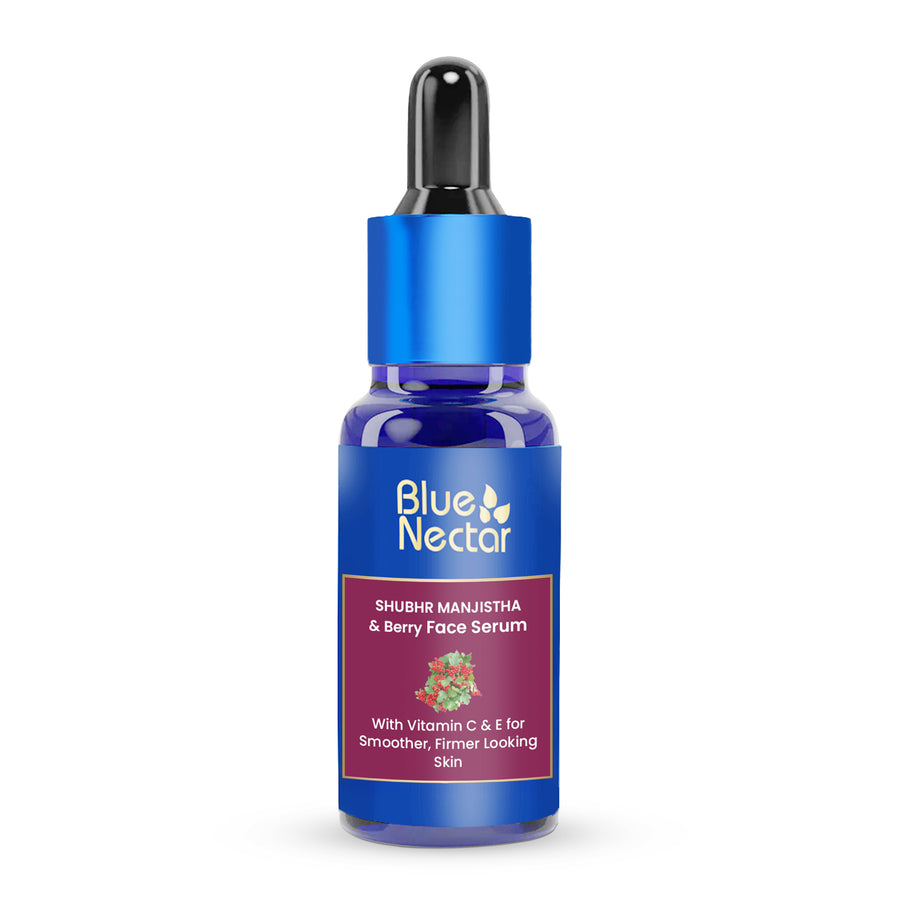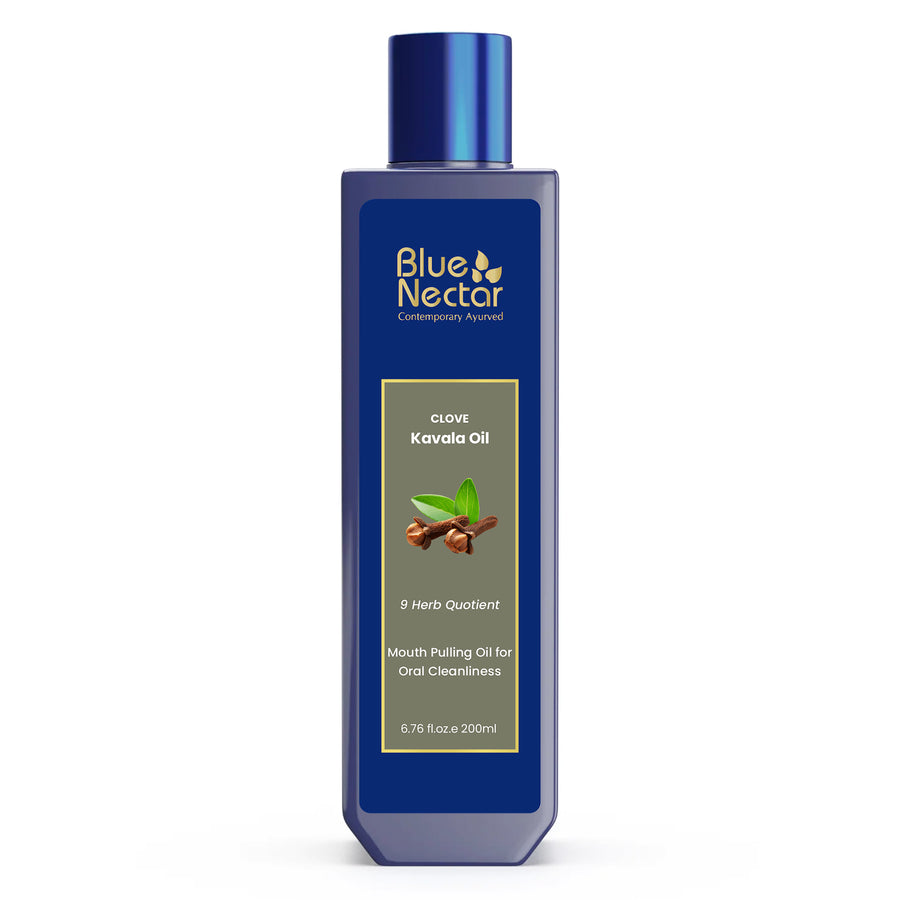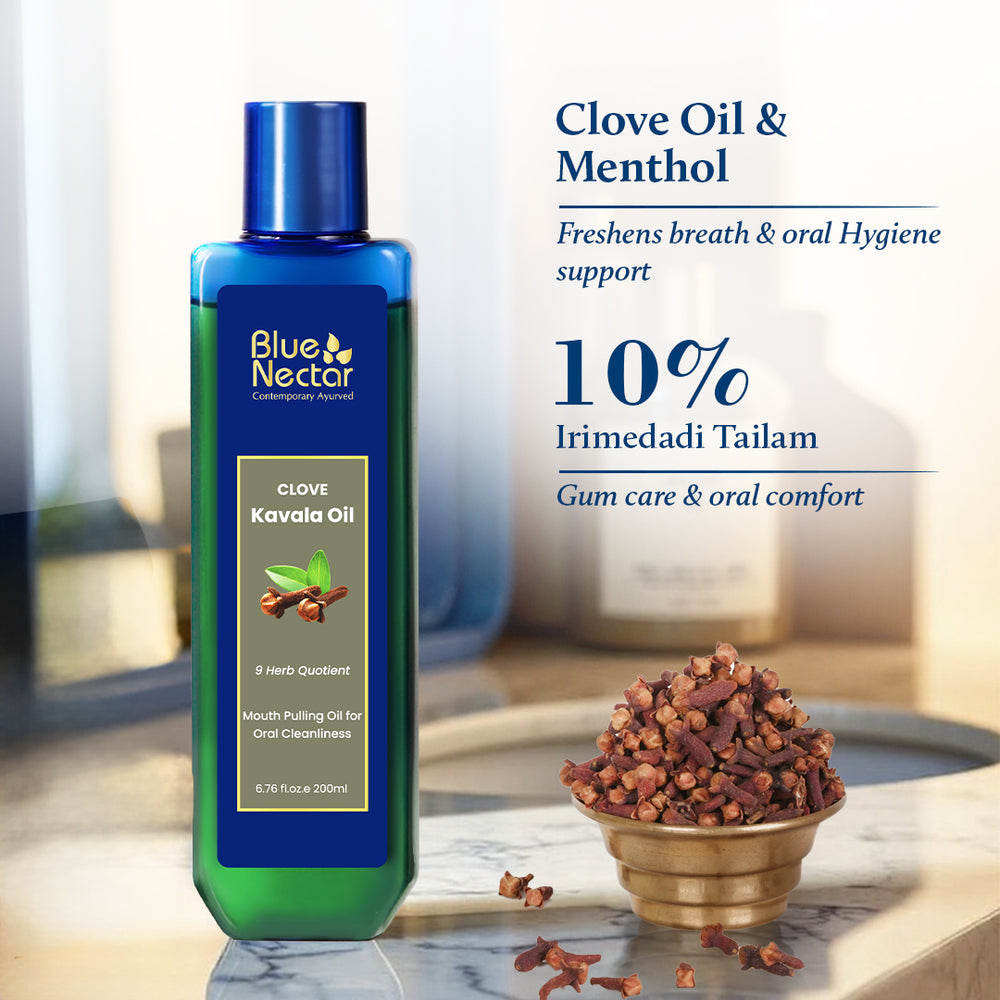How to choose the Best Face Serum for Acne Prone Skin?
| Estimated Reading Time: 13 minutes |
Acne and pimples can be a common and frustrating skin concern for many people. They can affect not only the physical appearance but also the self-confidence of individuals. While a proper skincare routine that includes cleansing, toning, and moisturizing (CTM) is essential for managing acne-prone skin, using the right skincare products can make a significant difference.
In recent years, Ayurvedic skincare products have gained popularity for their natural and holistic approach to skincare. Ayurveda, an ancient Indian system of medicine, emphasizes the use of natural ingredients and herbs to promote overall well-being, including skincare. Ayurvedic skincare products can be beneficial for individuals with oily and acne-prone skin as they often contain powerful herbs that can help soothe and heal the skin.

In this blog, we will be focusing on the best face serum for oily and acne-prone skin. Face serums are lightweight, fast-absorbing liquids that are applied after cleansing and toning, but before moisturizing. They are designed to deliver concentrated active ingredients deep into the skin, providing targeted benefits.
Highlights:
|
What is a Face Serum?
A face serum is a lightweight, fast-absorbing liquid skincare product that is typically formulated with high concentrations of natural ingredients to target specific skin concerns. Unlike moisturizers for face, which are thicker and designed to hydrate and lock in moisture, face serums or serums for face are designed to deliver potent active ingredients directly into the skin to provide targeted benefits.
Face serums can contain a wide variety of natural ingredients, depending on their intended purpose. These can include plant extracts, botanical oils, vitamins, antioxidants, and other natural compounds that are known for their beneficial effects on the skin. Natural face serums are typically free from harsh chemicals, synthetic fragrances, and artificial preservatives, making them a preferred option for those who prefer a more natural approach to skincare.
Natural face serums are formulated to address various skin concerns, such as hydration, brightening, anti-aging, acne-fighting, and calming inflammation. They are often used after cleansing and toning, but before moisturizing, to deliver the active ingredients deep into the skin for maximum efficacy. Due to their lightweight texture, face serums are easily absorbed by the skin, allowing the active ingredients to penetrate deeply and work effectively.
One of the key benefits of using a natural face serum or serum for face is that it can provide targeted treatment for specific skin concerns without adding unnecessary heaviness or greasiness to the skin. The concentrated amounts of natural ingredients in a face serum can help to nourish, repair, and rejuvenate the skin, promoting a healthier and more youthful complexion.
Using a natural face serum can be a valuable addition to your skincare routine if you prefer natural skincare products and want to address specific skin concerns effectively. However, it's important to choose a reputable brand and carefully read the ingredients list to ensure that the serum for face is truly natural and free from harmful chemicals. Additionally, patch testing and consulting with a dermatologist or skincare professional is recommended to determine the best face serum for your skin type and concerns.
What is Anti Acne Serum?
An anti-acne serum is a specialized skincare product that is formulated to specifically target and address acne-prone skin. It typically contains active ingredients that are known for their acne-fighting properties, such as antibacterial, anti-inflammatory, and exfoliating ingredients, to help prevent and treat acne breakouts.
Anti-acne serums for face are designed to penetrate deep into the skin to deliver concentrated amounts of active ingredients that can help regulate oil production, unclog pores, reduce inflammation, and kill acne-causing bacteria. These serums for face are typically lightweight and fast-absorbing, making them suitable for oily and acne-prone skin types.
The active ingredients commonly found in anti-acne serums can include salicylic acid, benzoyl peroxide, tea tree oil, niacinamide, retinol, and other botanical extracts known for their acne-fighting properties. These ingredients work together to help reduce the severity and frequency of acne breakouts, improve the overall texture and tone of the skin, and prevent future breakouts. However, these are all artificial ingredients. A natural anti acne face serum would contain natural active ingredients like neem, aloe vera and tea tree. These natural active ingredients are safe to use and make the serum the best face serum for oily skin.
Using an anti-acne serum as part of your skincare routine can be beneficial for individuals who struggle with acne-prone skin. It can help to unclog pores, reduce inflammation, and control excess oil production, which are key factors in preventing acne breakouts. However, it's important to follow the instructions provided by the product and not overuse the serum on face, as some active ingredients may cause dryness or irritation if used excessively.
It's also worth noting that anti-acne serums for face may not be suitable for all skin types or conditions, and it's important to consult with a dermatologist or skincare professional to determine the best anti-acne serum for your specific skin concerns and needs. Additionally, it's essential to maintain a consistent skincare routine that includes gentle cleansing, toning, and moisturizing, in combination with the use of an anti-acne serum, for optimal results.
Benefits of Anti Acne Serum
The use of an anti-acne serum for face can offer several benefits for those who struggle with acne-prone skin. Here are some key benefits of incorporating an anti-acne serum into your skincare routine:
1. Targeted treatment for acne-prone skin: Anti-acne serums are the best face serums that are specifically formulated with active ingredients which are known for their acne-fighting properties. These ingredients work to unclog pores, reduce inflammation, control excess oil production, and kill acne-causing bacteria, providing targeted treatment for acne-prone skin.
2. Helps prevent and treat acne breakouts: The active ingredients in anti-acne serums for face can help prevent the formation of acne breakouts by regulating oil production, reducing inflammation, and clearing clogged pores. They can also help to treat existing acne breakouts by accelerating the healing process and reducing redness and swelling.
3. Improves overall texture and tone of the skin: Anti-acne serums for face often contain exfoliating ingredients, such as salicylic acid or natural retinol, which can help to remove dead skin cells, unclog pores, and promote cellular turnover. This can result in a smoother, more refined skin texture and a brighter complexion.
4. Best face serum helps in reducing es the appearance of acne scars: Some anti-acne serums for face may also contain ingredients that can help fade the appearance of acne scars, such as niacinamide or plant based vitamin C. These ingredients can help to even out skin tone, reduce hyperpigmentation, and promote skin healing, resulting in a more even and youthful-looking complexion.
5. Best face serums are lightweight and fast-absorbing: Most anti-acne serums for face have a lightweight texture that is easily absorbed by the skin, making them the best face serum for oily skin and acne-prone skin types. They do not leave a heavy or greasy feeling on the skin, which makes them comfortable to wear throughout the day or under makeup.
6. Best face serum are customizable to individual skin needs: Anti-acne serums for face are available in various formulations, allowing for customization based on individual skin concerns and needs. Whether you need a face serum to control excess oil, reduce inflammation, or treat specific types of acne, there are options available to cater to different skin concerns.
7. Best face serum can be used in conjunction with other skincare products: Anti-acne serums for face can be easily incorporated into a skincare routine that includes other products, such as cleansers, toners, and moisturizer for face. They can complement other skincare products and provide an added layer of treatment for acne-prone skin.
How to choose the Best Face Serum for Acne Prone Skin?
Choosing the right and the best face serum for acne-prone skin requires careful consideration of the ingredients and formulation of the product. Here are some key factors to keep in mind when selecting the best face serum for acne-prone skin:
1. Light and quick-absorbing: Look for a sdamerum for face that has a lightweight texture and is easily absorbed by the skin. Avoid face serums that are heavy or greasy, as they may clog pores and potentially exacerbate acne breakouts. Lightweight serums for face are ideal for oily or acne-prone skin as they do not feel heavy on the skin and allow for easy layering with other skincare products.
2. Water-based - no oils: Opt for a water-based serum for face. The serum should be free from oils, as oils can potentially clog pores and trigger acne breakouts. Water-based serums for face are lighter in texture and less likely to contribute to excess oiliness on the skin, making them suitable for acne-prone skin.
3. Active herbs like neem: Look for a serum for face that contains active herbal ingredients known for their anti-acne properties, such as neem. Neem is a natural herb known for its antibacterial, antifungal, and anti-inflammatory properties, which can help combat acne-causing bacteria, reduce inflammation, and soothe irritated skin.
4. Plant-based Vitamin C: Vitamin C is a potent antioxidant that can help brighten the skin, promote collagen production, and fade the appearance of acne scars. Look for a face serum for glowing skin that contains plant-based Vitamin C, as it is generally suitable by most skin types and less likely to cause irritation compared to synthetic Vitamin C.
5. Plant-based Hyaluronic Acid: Hyaluronic Acid is a popular skincare ingredient that can provide hydration and plumpness to the skin. Choose a vitamin c face serum that contains plant-based Hyaluronic Acid, as it can help retain moisture in the skin without clogging pores or triggering acne breakouts.
6. Natural and not synthetic: Opt for a face serum that is made from natural, botanical-based ingredients and does not contain synthetic or harsh chemicals that may irritate the skin. Natural serums are generally gentle on the skin and less likely to cause adverse reactions, making them suitable for acne-prone skin.
7. Rose Water: Rose face water is known for its soothing and calming properties, which can help reduce inflammation and redness associated with acne-prone skin. Look for a face serum that contains rose water as an ingredient, as it can help soothe and balance the skin’s pH levels.
How to incorporate your Best Face Serum for Acne Prone Skin in your Skincare Routine?
Incorporating the best face serum for acne-prone skin into your skincare routine is easy and can be done in a few simple steps:
1. Start with a gentle face wash: Begin your skincare routine by cleansing your face with a gentle, ayurvedic face wash that contains active ingredients like neem. Neem has antibacterial properties that can help cleanse the skin, unclog pores, and prevent acne breakouts. Blue Nectar's Neem Face Wash is a great option to consider.
2. Tone with rose face water: After cleansing, use a rose water toner to help balance the pH of your skin and soothe any inflammation caused by acne. Rose water is known for its calming properties and can help reduce redness and irritation. You can simply spray or apply rose water on a cotton pad and gently pat it onto your face.
3. Apply the face serum: Next, apply the best face serum for acne-prone skin. Blue Nectar's Shubhr Plum & Neem Face Serum with Vitamin C is an excellent choice, as it contains potent ingredients like neem, Vitamin C, and plant-based Hyaluronic Acid that can help address acne concerns while nourishing the skin. Take a few drops of the serum for face and gently massage it onto your face using upward and outward motions.
4. Finish with SPF: It's important to protect your skin from harmful UV rays, even if you have acne-prone skin. Choose a non-comedogenic, oil-free, and lightweight sunscreen body lotion with SPF30 to shield your skin from the sun's rays. Applying sunscreen is the last step in your skincare routine and helps to prevent further damage to the skin.
By incorporating the best face serum for acne-prone skin into your skincare routine after cleansing, toning, and before applying sunscreen, you can provide your skin with the nourishing and targeted treatment it needs to combat acne while keeping it hydrated and protected.
Remember to always patch test new products and consult with a dermatologist if you have severe acne or persistent skin issues for personalized skincare recommendations. Be consistent with your skincare routine, and with time, you may notice an improvement in your acne-prone skin.
Do you know this hidden fact about Acne Serum?
A secret tip that most people don't know about acne serums is that they work best when put on skin that is just slightly damp. After washing your face, don't wait for it to be completely dry before putting on the serum. Instead, do it while your skin is still a little wet. By taking this easy step, the serum's active ingredients can work better to get rid of acne scars and balance out skin that is oily and prone to acne. It also keeps the serum working better over time and makes the skin more hydrated.
How do you make Serum for Acne at Home: DIY Acne Serum for Face
Making a DIY acne serum for your face can be a fun and cost-effective way to address acne-prone skin concerns at home. Here are some general steps to create a DIY acne serum:
1. Choose suitable ingredients: Look for natural ingredients that are known for their acne-fighting properties. Some common options include tea tree oil, witch hazel, aloe vera gel, rosehip seed oil, neem oil, and jojoba oil. These ingredients have anti-inflammatory, antimicrobial, and soothing properties that can help reduce acne breakouts and calm irritated skin.
2. Mix ingredients in appropriate proportions: Once you have chosen your ingredients, carefully measure and mix them in appropriate proportions. You can use a small glass dropper bottle or a glass container to store the serum. It's important to follow a recipe or guideline to ensure that the ingredients are properly mixed and balanced to create an effective face serum.
3. Consider essential oils: Essential oils can also be added to your DIY acne serum for face, but it's essential to use them with caution. Essential oils are highly concentrated and can cause skin irritation if not used properly. Always dilute essential oils in a carrier oil or other suitable base before applying them to the skin. Tea tree oil, lavender oil and frankincense oil are some examples of essential oils that are commonly used in DIY acne serums.

4. Perform a patch test: Before applying the DIY acne serum to your face, perform a patch test on a small area of your skin to check for any adverse reactions. This can help you avoid potential skin irritation or allergic reactions.
5. Store and use properly: Once you have made your DIY acne serum for face, store it in a cool, dark place to prolong its shelf life. Use it as directed, following your skincare routine, and avoid using it on broken or irritated skin.
It's important to note that DIY skincare products may not have the same efficacy and stability as commercially formulated products. Always do thorough research, follow reliable recipes, and use high-quality, natural ingredients to ensure safety and effectiveness. If you have severe acne or sensitive skin, consult with a dermatologist for personalized skincare recommendations.
Recommended Products by Blue Nectar:
Shubhr Vitamin C Face Serum with Hyaluronic Acid for Dark Spot Correction and Glowing Skin
Shubhr Plum & Neem Face Serum with Vitamin C for Acne Prone Skin and Acne Marks
Shubhr Rose Face Tonic Mist | Skin Toning & pH Balance
Kumkumadi Tailam Face Serum for Glowing Skin with Pure Sandalwood & Saffron
Shubhr Radiance Honey Face Cleanser | Radiance & Even Skin Tone






















Does this serum work well for people with sensitive or combination skin types?
Leave a comment